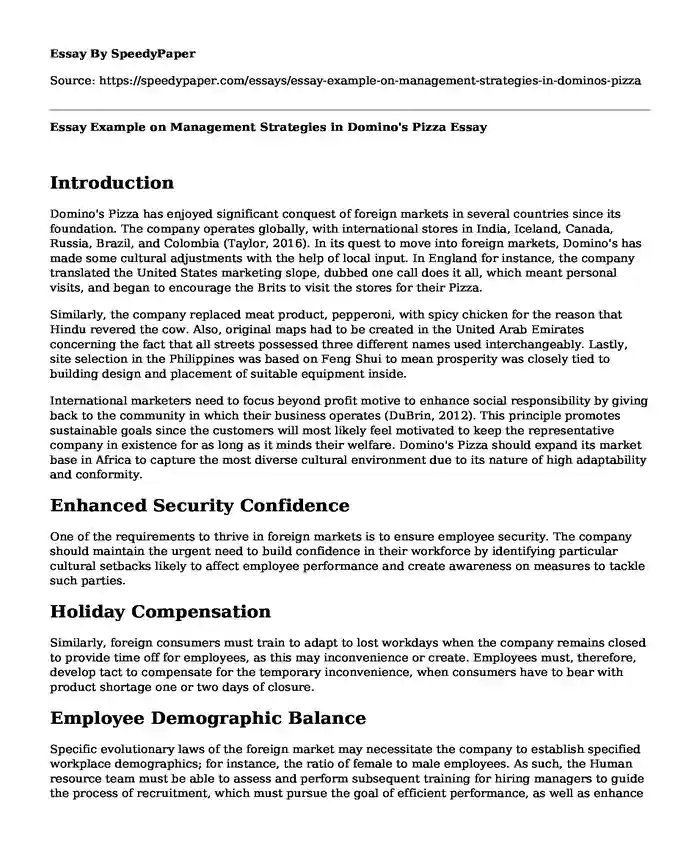
| Type of paper: | Essay |
| Categories: | Company Strategic management Strategic marketing Business strategy |
| Pages: | 3 |
| Wordcount: | 627 words |
Introduction
Domino's Pizza has enjoyed significant conquest of foreign markets in several countries since its foundation. The company operates globally, with international stores in India, Iceland, Canada, Russia, Brazil, and Colombia (Taylor, 2016). In its quest to move into foreign markets, Domino's has made some cultural adjustments with the help of local input. In England for instance, the company translated the United States marketing slope, dubbed one call does it all, which meant personal visits, and began to encourage the Brits to visit the stores for their Pizza.
Similarly, the company replaced meat product, pepperoni, with spicy chicken for the reason that Hindu revered the cow. Also, original maps had to be created in the United Arab Emirates concerning the fact that all streets possessed three different names used interchangeably. Lastly, site selection in the Philippines was based on Feng Shui to mean prosperity was closely tied to building design and placement of suitable equipment inside.
International marketers need to focus beyond profit motive to enhance social responsibility by giving back to the community in which their business operates (DuBrin, 2012). This principle promotes sustainable goals since the customers will most likely feel motivated to keep the representative company in existence for as long as it minds their welfare. Domino's Pizza should expand its market base in Africa to capture the most diverse cultural environment due to its nature of high adaptability and conformity.
Enhanced Security Confidence
One of the requirements to thrive in foreign markets is to ensure employee security. The company should maintain the urgent need to build confidence in their workforce by identifying particular cultural setbacks likely to affect employee performance and create awareness on measures to tackle such parties.
Holiday Compensation
Similarly, foreign consumers must train to adapt to lost workdays when the company remains closed to provide time off for employees, as this may inconvenience or create. Employees must, therefore, develop tact to compensate for the temporary inconvenience, when consumers have to bear with product shortage one or two days of closure.
Employee Demographic Balance
Specific evolutionary laws of the foreign market may necessitate the company to establish specified workplace demographics; for instance, the ratio of female to male employees. As such, the Human resource team must be able to assess and perform subsequent training for hiring managers to guide the process of recruitment, which must pursue the goal of efficient performance, as well as enhance the value of the foreign policy (Cekada 2011).
Adaptation to technology Advance
Change is dynamic, and detailed work schedule requires organizations to understand how new equipment or processes need to be implemented to adapt the latest changes in foreign markets. The organization should, therefore, cite the workplace challenges where employees will require the new standards or technologies to operate the evolving operational challenges.
Strong Organizational Standards
Notably, assessment of the organization's needs implies the importance of regular training to help inform the employees of the contemporary market trends. Moreover, the management team requires the interpersonal skills needed for teamwork, and therefore, inspire the majority of stakeholders to aspire and build the confidence of success in the foreign market (Khan and Ahmad 2012). Ideally, proper interpersonal skills are imperative in an international market specifically to help understand the new customers based on preferences and standards of living. The company must ensure that management teams within the foreign markets are adequately trained to handle their stakeholders professionally.
References
Cekada, Tracey L. "Conducting an effective needs assessment." Professional Safety, (2011): 28-34.
DuBrin, Andrew J. Essentials of Management. Mason, Ohio: South-Western/Thomson Learning, 2012. Print.
Khan, Aamir, and Wisal Ahmad. "Leader's interpersonal skills and its effectiveness at different levels of management." International Journal of Business and Social Science 3.4 (2012).
Taylor, Bill. "How Domino's Pizza Reinvented Itself." Harvard Business Review. Web, 2016. 10 Nov. 2016. Retrieved from https://hbr.org/2016/11/how-dominos-pizza-reinvented-itself
Cite this page
Essay Example on Management Strategies in Domino's Pizza. (2023, Jan 13). Retrieved from https://speedypaper.net/essays/essay-example-on-management-strategies-in-dominos-pizza
Request Removal
If you are the original author of this essay and no longer wish to have it published on the SpeedyPaper website, please click below to request its removal:
- Essay Sample with Analysis of the Causes of Conflict in Pakistan
- Professional Goals Essay Examples
- Essay Example on Islam and Women
- Free Essay Sample about Passenger Coaches for Urban and Peril-Urban Center in America
- Latin American Culture Essay Sample
- Essay Sample on Hamilton's Policies for American Economic Growth in the Early National Period
- Pragmatist Decision Making. Free Essay
Popular categories




